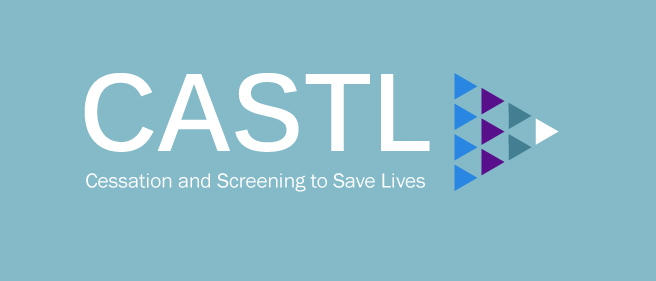The Problem
Lung cancer screening is a new way to find lung cancer early, when it is most treatable. Offering smoking cessation help to current smokers who wish to quit is an essential part of screening programs. However, we don’t yet know the best way to offer this help and each lung cancer-screening program is set up differently to best serve their own local community. There is a need to develop a way of offering smoking cessation services that can work in different types of screening programs and help the most people to quit.
The Study
The CASTL (Cessation And Screening To Save Lives) study will develop a blueprint for smoking cessation services in a lung cancer screening program. 18 different lung cancer screening programs across the country will enroll people who are having lung cancer screenings. Each participant will receive different combinations of smoking cessation treatments. The study will then look at each combination to see how much it helped people to quit and what problems the program staff encountered when offering it.
This study has the unique power to tell us not just what individual smoking cessation services help people quit, but what the best combination of those services are. It will let us design the best overall smoking cessation “package” for any type of screening program.
The CASTL study is one part of a larger national effort called the SCALE (Smoking Cessation at Lung Examination) collaboration. As part of the collaboration, eight different teams are working to combine their efforts and share what they discover so that screening programs across the country will benefit. This is a one-of-a-kind research collaboration with the potential to have far-reaching effects for lung cancer prevention.
How GO2 for Lung Cancer Is Involved
GO2 for Lung Cancer is a key partner in this project and has been involved since the initial study design phase with the Principal Investigators, Dr. Jamie Ostroff (Memorial Sloan-Kettering Cancer Center) and Dr. Donna Shelley (New York University). The study is using the GO2 for Lung Cancer Screening Centers of Excellence Network as the field sites for this study. These screening centers are committed to following best practices of lung cancer screening and represent the diverse array of screening program types currently being implemented making them ideal places for this research. GO2 for Lung Cancer staff are key personnel on the CASTL research team and are responsible for site recruitment and coordination.
The following Screening Centers of Excellence are active field sites for the study:
| Screening Center | Location |
|---|---|
| St. Mary Medical Center | Hobart, IN |
| University of Southern California – Keck School of Medicine | Los Angeles, CA |
| New York University Winthrop Hospital | Mineola, NY |
| Legacy Good Samaritan Medical Center | Portland, OR |
| Riverside Health | Kankakee, IL |
| John Muir Cancer Institute | Walnut Creek, CA |
| Maine Medical Center Cancer Institute | Scarborough, ME |
| WellStar Health System | Marietta, GA |
| Levine Cancer Institute – Carolinas Healthcare System Blue Ridge | Charlotte, NC |
| Fairfield Medical Center | Lancaster, OH |
| Weill Cornell Medical College | New York, NY |
How Can You Help?
If you are a lung cancer-screening program and are interested in potentially acting as a field site for the CASTL study, please contact GO2 for Lung Cancer’s Associate Director of Clinical Research, Andrew Ciupek to find out more about the study and joining.
If you are a current smoker and are undergoing lung cancer screening at one of the listed study sites, consider asking about the CASTL study to learn more about how participating can offer high quality help to quit and offer you the chance help this effort to understand the best ways to help those who are looking to quit to reduce their risk of lung cancer.
How Is This Research Funded?
This study is funded by National Cancer Institute R01 Grant R01CA207442 to PIs Dr. Jamie Ostroff and Dr. Donna Shelley. GO2 for Lung Cancer also financially supports additional staff time on this project. Click here to donate to GO2 for Lung Cancer’s research.

